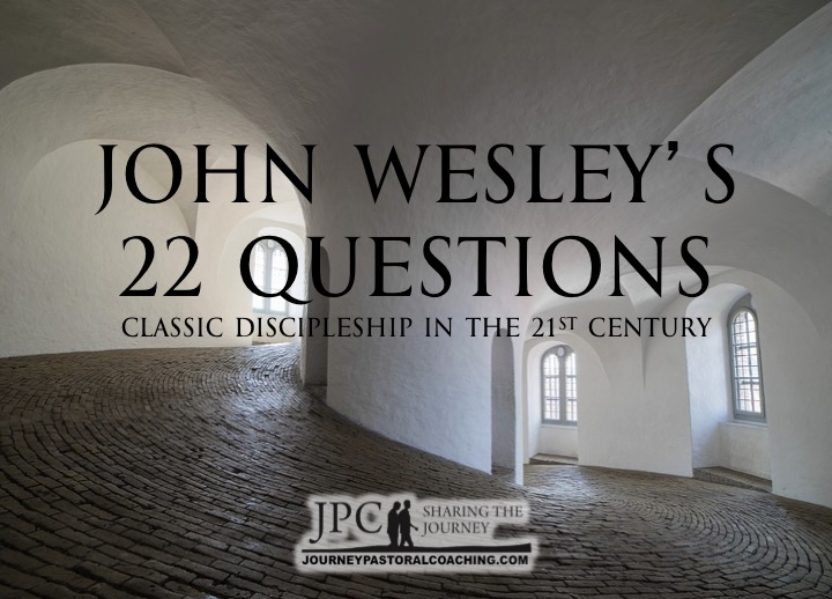John Wesley’s 22 Questions
In 1729, while a student at Oxford University, the humble but history-making pastor and preacher, John Wesley, started a discipleship group with his brother Charles.
(Note: Charles went on to become the prolific hymn writer in history, writing almost 9000 hymns. Among them are “Hark! The Herald Angels Sing,” “And Can It Be,” “O for a Thousand Tongues to Sing,” “Jesus, Lover of My Soul,” and “Christ the Lord Is Risen Today”.)
The Wesleys formed the nucleus of a group of up to 25 members that met regularly for prayer, Bible study, and shared discipleship. Future church leaders like George Whitfield and John Gambold were formed in this furnace of what I call a “shared journey in Christ.”
However, some of Wesley’s fellow Oxford students did not take kindly to the group’s existence or goals, derisively labeling them, “The Holy Club.” But ridicule and persecution could not dissuade Wesley or his friends: they were intent on not only believing right creeds but on living in and for Christ with every beat of their heart and every fiber of their being. Individually and together, they pressed in to know Him, glorify Him, and take full pleasure in Him.
The Method
Club members devised a systematic approach, a “method,” to foster individual and shared discipleship. Their method involved rigorous self-examination. Every day, every member asked himself twenty-two questions about his devotion and discipleship. He used these questions to “methodically” examine his life – not just his beliefs, but his living out those beliefs. Members would also query one another. Commitment, discipline, openness, accountability, and a shared journey defined their approach. “The Holy Club,” was the seed of what was to become the Methodist movement.
Here is the list of their twenty-two questions:
- Am I consciously or unconsciously creating the impression that I am better than I reallyam? In other words, am I a hypocrite?
- Am I honest in all my acts and words, or do I exaggerate?
- Do I confidentially pass on to another what was told to me in confidence?
- Can I be trusted?
- Am I a slave to dress, friends, work, or habits?
- Am I self-conscious, self-pitying, or self-justifying?
- Did the Bible live in me today?
- Do I give it time to speak to me every day?
- Am I enjoying prayer?
- When did I last speak to someone else about my faith?
- Do I pray about the money I spend?
- Do I get to bed on time and get up on time?
- Do I disobey God in anything?
- Do I insist upon doing something about which my conscience is uneasy?
- Am I defeated in any part of my life?
- Am I jealous, impure, critical, irritable, touchy, or distrustful?
- How do I spend my spare time?
- Am I proud?
- Do I thank God that I am not as other people, especially as the Pharisees who despised the publican?
- Is there anyone whom I fear, dislike, disown, criticize, hold a resentment toward or disregard? If so, what am I doing about it?
- Do I grumble or complain constantly?
- Is Christ real to me?
From this time as a student at Oxford, John Wesley asked himself these questions every day of his life. He recorded his responses in his journal, all in his desire to grow spiritually. For Wesley, doing flowed from being, and doing then fed being, producing a whole life in Christ. He followed this spiritual discipline all of his life. As late as 1781, Wesley published a list of his questions in the Arminian Magazine.
A 21st Century Application of The Method
Twice a year at Journey Pastoral Coaching, our members submit themselves to a discipline based on the method of Wesley and the Holy Club. We call it our Discipleship Checkup.
We’ve taken Wesley’s method and expanded it. Building on the original twenty-two questions, we’ve expanded them into a list of categories and questions, each category comprised of ten questions. The Journey coach then walks each member through a private session in which the member, led by the Holy Spirit, “blindly” selects categories and questions. The Holy Spirit guides in selecting the questions God would have each person ask him or herself. The coach reads each selected question to the Journey member who then answers to him- or herself – a critical point. The coach takes notes on each member’s responses and later sends those notes to the member for his/her daily reflection and prayer.
This bi-annual event has become one of the most anticipated activities in our coaching community, one in which the Holy Spirit guides and speaks in powerful ways. It never fails to see moving sessions together and “epiphanies”: “I can’t believe I chose that question,” is repeated multiple times each day.
It goes without saying that the higher goal of this exercise is that just such an approach or method be a substantive part of our daily discipleship in Christ. This is another frequent coaching conversation.
The easing into autumn is a perfect time for this reflection-focused spiritual discipline. And, obviously, the weeks prior to Good Friday and Resurrection Sunday are an ideal time to examine ourselves, our discipleship, and our devotion to the One who died for our sins and then rose again for our justification.
The first and third weeks of April 2019 will be given over to our adaptation of the John Wesley method, our Discipleship Checkup. Walking this discipline with our current members is a ministry experience that is second to none. I can’t wait to get started!
What questions have we added? There are too many to list, but here’s a sample (Category and Question):
1. Jesus:
What are three of my “Jesus strengths?” (Three personal characteristics that most clearly reveal Jesus to my world – characteristics mentioned by significant others in my life)
What are two of my “Jesus weaknesses?” (Two of my personal characteristics that hide Jesus from my world – characteristics mentioned by significant others in my life – if none, maybe it’s time you asked someone)
2. Peers:
Am I tending toward connection and community or toward individualism and isolation? Describe. What am I doing about it?
3. Prayer:
How would I describe my prayer life?
4. Stewardship:
What am I doing to build for a lifetime of healthy and effective ministry?
5. Study:
What book (apart from the Bible) has most helped me grow in the fullness of my salvation and sanctification? How so?
6. Word:
How is the Word revealing Jesus to me right now in my daily reading?
7. Build the Minister, Build the Ministry:
Do I depend more on my talents or my character in ministry?
8. Integrity:
What was the last character issue I asked for help in? Who did I ask? Results?
9. Creation and Call:
Allan Bloom (In his book, “The Closing of the American Mind”) writes: “The self is the modern substitute for the soul.” Have I substituted my “self” for my “soul?”
10. Grace and Gratitude:
How active is grace in my life? Can I describe where and how in specific terms or only in general terms?
Three Questions for You and One Possible Answer
How might a commitment to this kind of honest examination of your spiritual life sharpen your commitment to Christ?
How might this kind of spiritual accountability impact the mission of Christ in the world?
What could your church group, leadership team, or pastoral staff become using such a method?
A member of Journey Pastoral Coaching has published a similar guide and journal that could very well be just the tool you’re looking for in your desire for a workable approach – method – to discipleship. It’s called The Daily Growth Journal, and it’s available for purchase by clicking here.
A Final Word
Wesley’s twenty-two questions and Journey’s Discipleship Checkup are two means to the same end: knowing Christ in His fullness, being conformed to Christ’s image, and serving Christ faithfully in His mission to make disciples of all nations. We know that Wesley’s method saw great fruit: it launched Methodism and helped to make disciples of Jesus in all the world. Journey’s method is more humble to be sure, but its effect is significant, testified to by our grateful members (and by the non-members who ask to participate).
Here’s the point. Whatever the approach you take, take one. And if need be, make one. But accept the wise counsel of Christian leaders over twenty-one centuries and learn the value and beauty of walking with Christ in a method. The Bible calls it discipleship. You’ll call it an answer to prayer as you walk ever deeper in the Savior who so loved you that He gave His life for you on the Cross and then rose again.
—————
NOTE: Journey Pastoral Coaching provides pastoral coaching to Millennial ministers.
Saddled with large student debt, just beginning to set up homes and start families, and serving in low paying first and second positions, Millennials are those who most desire but can least afford to pay for pastoral coaching.
So we offer it to them at NO COST: Our members do not PAY for coaching; they EARN it.
We are able to do so through the faithful and generous gifts of friends who want to see young leaders not only enter the ministry, but remain in the ministry. If you or your church would like to help Millennial ministers in 21 US states and 5 nations build strong for a lifetime in ministry, please click here to contact us by email or to support Journey monthly or with your one-time gift. Thank you.
We also invite you to click and subscribe to our twice-monthly blogs at journeypastoralcoaching.com
“In the early years when I was becoming a pastor, I needed a pastor.”
Eugene H. Peterson, The Pastor: A Memoir



